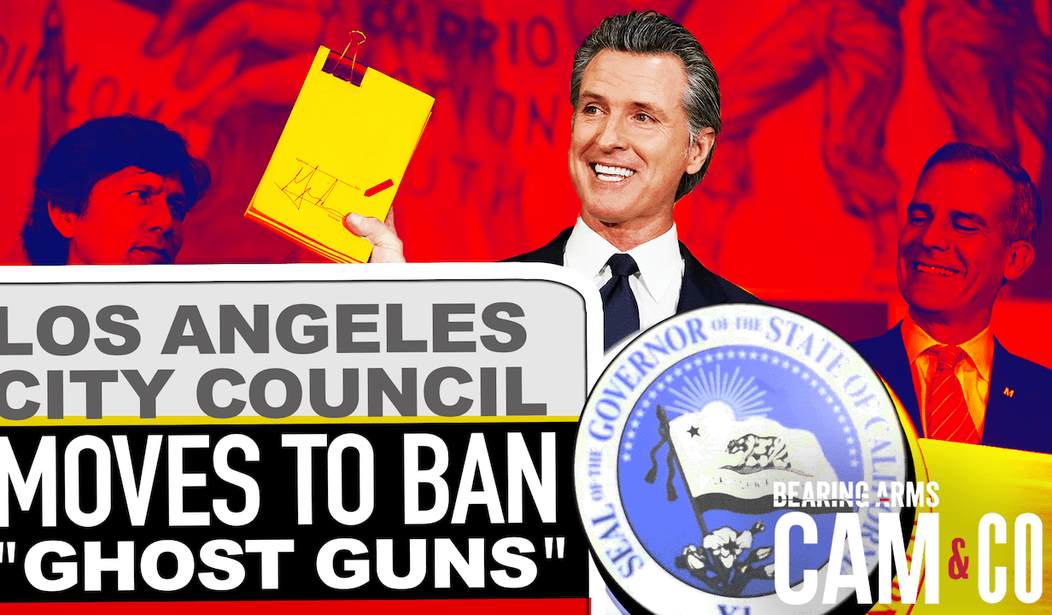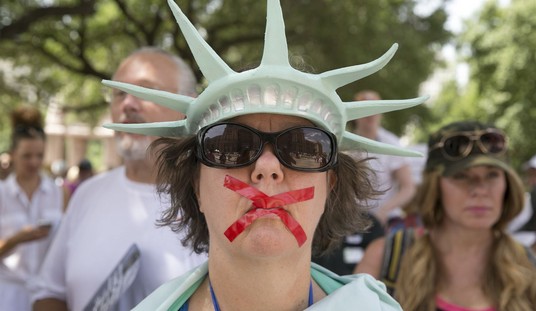With shootings and homicides on the rise in Los Angeles, local politicians want to show they’re “doing something” to address the concerns of residents, but as we discuss on today’s Bearing Arms’ Cam & Co, their big idea will do absolutely nothing to stop criminals.
Today the Los Angeles City Council was expected to approve a ban on so-called ghost guns, but ended up delaying action until next week in order to give the City Attorney a few days to come up with a draft ordinance. Still, even without an official proposal in place, we know the arguments that advocates are making for their new regulations on unfinished frames and receivers as well as completed home-built firearms.
The unfinished parts are inexpensive and not required under federal law to have serial numbers or a background check to purchase. According to the gun control advocacy organization Everytown For Gun Safety, an AR-15 ghost gun kit and lower receiver can be purchased for $345.
More than 40% of guns confiscated by the federal Bureau of Alcohol, Tobacco, Firearms and Explosives, and one-third of crime guns recovered by the Los Angeles Police Department in Los Angeles in 2020, were ghost guns, according to Koretz.
The motion, if passed, would also request the Los Angeles Police Department to report within 14 days to the City Council on current data on the impact of ghost guns in Los Angeles, including the number of non-serialized firearms confiscated from people and recovered at crime scenes and the number of shootings and homicides that involved non-serialized firearms.
Why do I say that this ordinance will do nothing to stop criminals? For starters, it’s already illegal under California law to possess an unserialized firearm. In fact, it’s been illegal for the past three years. Here’s how the gun control group Giffords describes California’s ban on unserialized firearms:
- Prior to assembling or manufacturing a firearm from a ghost gun kit or components, a person must apply to the California Department of Justice (“DOJ”) for a unique serial number or mark of identification unique to that firearm.3 State law directs DOJ to issue serial numbers to applicants who meet all of the following requirements: (1) have a firearm safety certificate, (2) have completed a firearms eligibility background check verifying that they are eligible to possess firearms under both state and federal law, (3) presented proof of age and identity showing they are at least 21 years of age, and (4) provided a description of the firearm they intend to manufacture or assemble.4
- After receiving that serial number from DOJ, the person must engrave or permanently affix the unique serial number to their firearm within 10 days of manufacturing or assembling the firearm.5
- The individual must provide information about the newly serialized firearm, including the identity of the owner of the firearm, to DOJ.6 Firearms manufactured or assembled pursuant to these provisions are for personal use only and generally cannot be sold or transferred.7
- Anyone in possession of an unserialized firearm must apply to the DOJ for a serial number and must serialize the firearm, or must otherwise relinquish the unserialized firearm to law enforcement.8
- The law also expressly prohibits individuals or companies from knowingly allowing, facilitating, aiding, or abetting the manufacture or assembly of a firearm by individuals who are prohibited from possessing a firearm under state law.9
- In addition, California law does not authorize people to assemble prohibited weapons such as assault weapons, machine guns, or handguns that have not passed testing and certification requirements under California’s Unsafe Handgun Act consumer safety law.
So, anyone in Los Angeles that’s building a homemade firearm without first applying to CalDOJ for a unique serial number is violating state law. The local ordinance that the City Council is demanding isn’t just duplicating a gun control law that’s already in place, but may very well end up imposing a less onerous penalty than the state law, which punishes possessors of unserialized firearms by up to a year in the county jail (six months if the “ghost gun” isn’t a handgun).
L.A.’s new ordinance, if approved, will likely be a misdemeanor offense, and guess what’s been going on with misdemeanor arrests in the state over the past few decades?
Arrest rates—measured as the number of arrests per 100,000 residents—have dropped dramatically over the past few decades. The overall arrest rate peaked at 6,757 arrests per 100,000 residents in 1989 and then fell precipitously throughout the 1990s. It has declined steadily since 2006, reaching a historic low of 2,642 in 2019. The decline is driven by fewer arrests for misdemeanor offenses and of juveniles and young adults. According to the FBI’s Uniform Crime Report, the nationwide arrest rate is 3,024 per 100,000 residents, with California ranking 36th highest among states.
Arrest rates in California’s more populated areas, like Los Angeles, are also lower than most rural counties, so there’s not much reason to believe that the city’s ordinance would be heavily enforced if it ends up being approved by the City Council.
Criminals have been ignoring the state prohibition on unserialized firearms for as long as it’s been in place, so why would they suddenly pay attention to a local ordinance? And more importantly, as I mentioned in another piece earlier today, California prohibits the purchase of ammunition without a background check. If California’s gun control laws were really effective at stopping criminals, it wouldn’t matter if “ghost guns” were forbidden or not because prohibited persons wouldn’t be able to get their hands on ammunition. Instead of building their own pistols, they’d be making a paperweight.
This proposal by a pair of the most vociferous gun control activists on the L.A. City Council is nothing more than an attempt to reassure residents that they’re “doing something” in the face of rising shootings and homicides. If they were truly serious about addressing public safety, they’d be focusing on improving the arrest rates for shootings and murders instead of trying to ban something that’s already illegal under California state law.










Join the conversation as a VIP Member